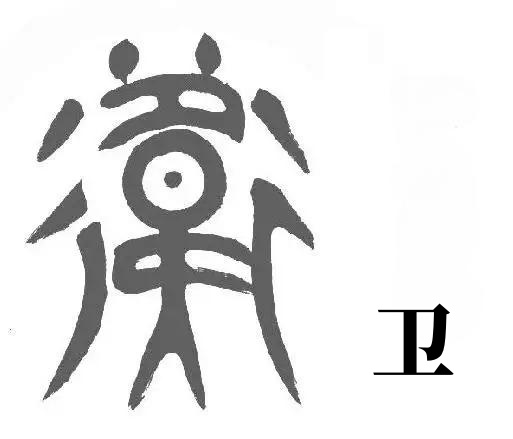I. Origins and Historical Development of the Wei(wèi) Surname

1. Multiple Origins with the Ji Clan at the Core
The origin of the Wei surname is deeply rooted in the Ji clan. In the early Western Zhou Dynasty, Ji Feng, the ninth son of King Wen of Zhou, also known as Kang Shu, played a crucial role in suppressing the "Rebellion of the Three Guards" alongside King Cheng of Zhou. As a reward, he was enfeoffed in Chaoge (present - day Qi County, Henan Province), the former capital of the Shang Dynasty, where he established the State of Wei to govern the remnants of the Shang people. After several relocations, the State of Wei was eventually annexed by the State of Qin in 209 BC. Subsequently, its descendants adopted the name of the state, "Wei," as their surname, and they revere Kang Shu as the founding ancestor of the Wei family.
2. A Branch from the Yao Clan
Legend has it that descendants of Emperor Shun once established a state named Wei, and later, they took the state's name as their surname.
3. Name - conferring and Surname - changing Incidents
For example, Wei Qing, a famous general in the Western Han Dynasty, originally had the surname Zheng but was bestowed the surname Wei due to his military achievements. Emperor Cheng of the Han Dynasty also bestowed the surname Wei upon his maid Li Ping.
4. Integration of Ethnic Minorities
During the process of Sinicization, ethnic groups such as the Xianbei, Manchu, and Mongol changed their surnames to Wei, which reflects the historical trend of ethnic integration.
II. Historical Figures and Their Contributions
1. Wei Qing
A renowned general in the Western Han Dynasty, he led seven campaigns against the Xiongnu, greatly contributing to the stability of the Han Dynasty's frontiers.
2. Wei Zifu
The queen of Emperor Wu of the Han Dynasty, she was well - known for her virtues. She promoted frugality in the royal court and the development of court culture.
3. Wei Shuo
Also known as "Lady Wei," she was the calligraphy teacher who enlightened Wang Xizhi. Renowned for her official script and regular script, her work Bi Zhen Tu (The Diagram of the Pen) has had a profound influence on Chinese calligraphy for over a thousand years.
4. Wei Guan
A statesman and calligrapher in the Western Jin Dynasty, his cursive script was as famous as that of Su Jing, and they were collectively known as "Two Masterpieces in One Office."
5. Wei Lihuang
A famous anti - Japanese general in the Republic of China era. Leading the expeditionary force, he achieved remarkable military feats in Myanmar.
III. Family Migration and Inheritance
1. Early Distribution
Centered in Henan and Shanxi, during the Qin and Han Dynasties, the Wei family spread to Shaanxi, Sichuan, and other regions.
2. South - North Cultural Integration
During the Wei, Jin, Southern and Northern Dynasties, members of the Wei family, along with the gentry class, migrated southward to Jiangsu and Zhejiang. In the Ming and Qing Dynasties, the surname further expanded to southern China and overseas.
3. Modern Distribution
Currently, Shaanxi, Shanxi, Sichuan, and Henan are the core areas where people with the surname Wei are concentrated, accounting for 77% of the total Wei population in China, presenting a distribution pattern of "centered in Shanxi and Shaanxi and spreading southward."
IV. Cultural Significance and Social Impact
1. Clan Culture
The Wei family attaches great importance to the compilation of genealogies and the inheritance of family mottos. For instance, the adage "Making a living by farming and studying; running the family with diligence and thrift" reflects the influence of Confucian ethics.
2. Junwang and Tanghao
Chenliu and Hedong are important Junwang (ancestral hometowns) of the Wei family, symbolizing their historical status. Tanghao, such as "Chenliu Hall," reflects the geographical origin of the clan.
3. A Microcosm of Multi - ethnic Integration
The origins of the Wei surname include elements from multiple ethnic groups such as the Ji clan, Xianbei, and Manchu, which reflects the "pluralistic yet unified" characteristic of Chinese civilization.
4. Historical Contributions
Although the State of Wei was a small state, it gave rise to prominent figures like Shang Yang (a legalist), Wu Qi (a strategist), and Lü Buwei (a statesman), who had a significant impact on the course of Chinese history.
Conclusion
With a population of approximately 670,000, the Wei surname, despite its relatively small size, is an important representative of Chinese surname culture due to its profound historical accumulation and cultural diversity. From loyal and brave generals in ancient times to patriotic heroes in modern times, the descendants of the Wei family have always been in sync with the development of Chinese civilization, demonstrating the interweaving of family spirit and national .